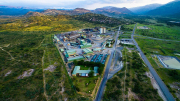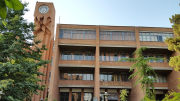
Samsung Electronics promised better shareholder returns, dismissed fears over smartphone market saturation and signalled a more aggressive acquisitions policy Wednesday at a rare analysts' briefing to boost its flagging stock price.
Addressing the first such event for eight years, the company's top executives talked up its growth potential and offered some guidance on how it plans to spend a $50 billion cash pile.
President and chief financial officer Lee Sang-hoon said Samsung would "put more emphasis on shareholder return" and would target a dividend yield this year of 1.0 percent of the average share price.
The company will review its shareholder return policy every three years to reflect changes in business conditions, he added.
The current dividend yield is around 0.5 percent, a return that has seen some shareholders accuse the world's largest technology company by revenue of hoarding cash.
Samsung's share price trading at 1,460,000 won at midday, down 1.68 percent from Tuesday's close.
The firm has posted record profits in six of the past seven quarters -- largely due to its growing dominance of the global smartphone market -- but its stock price trades at a significant discount compared to its rivals.
At one point this year, it was down as much as 20 percent.
Wednesday's briefing for 350 invited analysts and institutional investors at a Seoul Hotel, was a rare event for a company renowned for its relative lack of transparency.
Samsung's massive net cash balance is equivalent to more than 20 percent of its market capitalisation, and some analysts have predicted it could grow to $100 billion over the next two years.
Lee denied the amount was excessive, and said that -- along with the increased dividend yield -- it would be used to fund significant investment in research and development, particularly in software, to help secure future growth.
He also acknowledged Samsung had been "somewhat conservative" in the field of mergers and acquisitions, and added that this "may be different in the future".
That message was underlined by chief executive officer Kwon Oh-Hyun who suggested the company was looking for firms that could help sharpen its technological innovation edge.
"We are quite conservative, but we've changed our mind. We will aggressively acquire some companies as long as they provide nice technology," Kwon said.
Much of the briefing was focused on countering market concerns that profit growth is unsustainable, especially in an increasingly saturated smartphone sector.
Its mobile unit accounted for two-thirds of Samsung's record operating profit of 10.2 trillion won ($10 billion) in the third quarter, but analysts noted stagnant growth in sales of its flagship Galaxy S smartphones.
The head of the mobile division, JK Shin, said that while an estimated 1.5 billion people currently used smartphones, global penetration was still only 21 percent, leaving "substantial room" for growth.
He predicted the market would grow by more than 10 percent annually over the next four years, fuelled by sales in emerging economies such as India and China.
Another growth driver will be smartphones supporting long-term evolution (LTE) 4G wireless communication technology, which Shin said would account for 50 percent of all such gadgets by 2017.
He also underlined Samsung's ambition to topple rival Apple from the top of the tablet market as it seeks to become the "most beloved company in mobile".
Most large tech companies hold regular analyst briefings, but Wednesday's event was Samsung's first since 2005 and only the second in its history.
afp, photo by samsungtomorrow








































